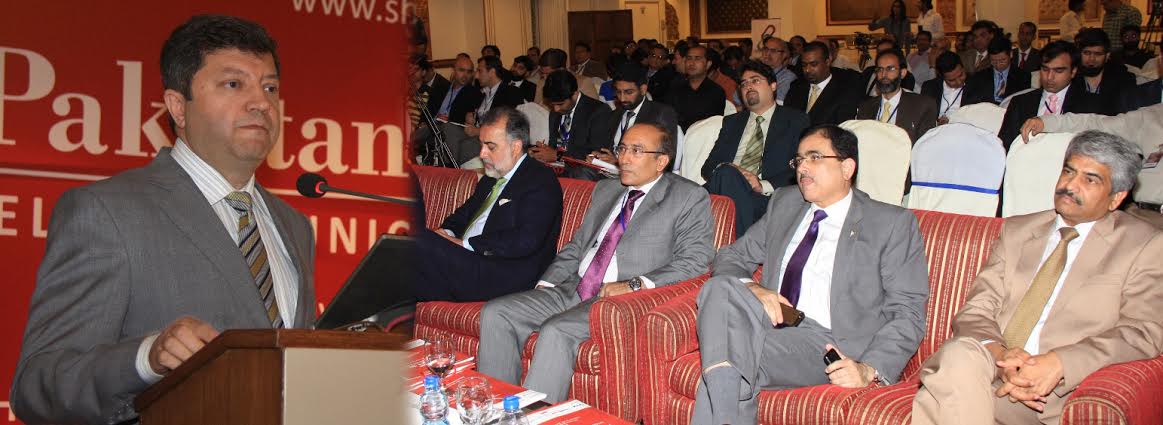ISLAMABAD ( BMZ REPORT )
The 7TH Pakistan TeleCON 2014 concluded here today with regulators and experts determining that a data revolution, connected communities and a digitized ecosystem will define the telecom sector in Pakistan. The theme of the conference was “The Changing Dynamics of Telecom and ICT Sectors in Pakistan”.
Organized annually by SHAMROCK Conferences International, to highlight and debate on critical issues and opportunities concerning the telecommunication sector, including ICT trends and its impact on economy, the conference was a well-attended affair with participation from a cross-section of companies and organizations.
In her message to the organizers, Minister Anusha Rehman said, “The priority of our government is to use next generation ICT services particularly mobile broadband for an accelerated digitization ecosystem to enable socio economic development expanding knowledge based economy and spur economic growth.”
Chairman PTA Syed Ismail Shah in his keynote address reiterated the government’s resolve to support and develop the telecom sector with investor and consumer friendly policies. He said, “We expect a strong demand for 3G as operators will start rolling out services and consumers getting excited about the new enabling technologies; it will connect communities and people, the whole experience will be like a data revolution.”
Mr. Mudassar Hussain, Member Telecom, Ministry of MoIT highlighted that on the policy front, the government had invited industry and public consultants to be partners in its decision making; and in this context a review of the telecom policy was also in the offing.
In his opening remarks, Menin Rodrigues, Convener of TeleCON 2014 said, “The telecom sector has performed exceedingly well and while the Ministry of IT & Telecom and PTA are doing all that is right for the country and its citizens, some issues of level playing fields for stakeholders and proliferation of grey telephony persist.”
In the opening session on “Regulatory”, prominent industry personality Mr. Zouhair A Khaliq, now a telecom consultant in the UK appreciated the growth in telecom in the country and how it has evolved from a struggling industry to its phenomenal growth today. He reiterated that the policy framework must have constructive dialogue with industry players to remain relevant in the future, including the rationalization of taxes.
The Convener of the Internet Service Providers Association of Pakistan (ISPAK) Mr. Wahaj us Siraj said that the government and regulatory bodies must create a balanced approach to its dealings with stakeholders. He complimented the PTA for a transparent spectrum auction process. Giving his assessment of telecom as an economic sector, Mr. Ali Salman, CEO, Policy Research Institute of Market Economy (PRIME) informed the participants that flawed polices and lack of controls are a result of non compliance of economic principles and parameters, and therefore, grey trafficking has increased.
In the session on “Technology” Mr. Omer Bin Tariq, Director Internet & Devices, Telenor Pakistan said, empowering societies, Internet for all, will shape the future of a progressive Pakistan; and the socio economic impact of 3G will improve education, health, commerce and entrepreneurship. “A correct rollout plan can spur economic and GDP growth” he added. Mr. Veqar ul Islam, President of Touchpoint Group pointed out that indeed the mobile phone is the ultimate universal access tool; it has given power to do things like never before, bridging the digital divide. The Chief Operating Officer of Supernet Mr. Hamid Nawaz dilating on the subject of enabling satellite backhaul networks said that his company was ready to support 3G.
Mr. Naeem Zamindar, CEO, Wateen Telecom in an eloquent style spoke about high speed connection for economic growth; he pointed out technology and social transformation is at hand as access to data will revolutionize our world in leaps and bounds. Providing optic-fiber connection to HEC institutions across Pakistan, his company has given every citizen an opportunity to access broadband. An interesting presentation on E-Waste was made by Mr. Adnan Shahid, Chief Ideas Officer of Ideogeny who glaringly highlighted the sorry state of affairs in proliferation of electronic waste and how this practice continues to be an environmental and health hazard for the people of Pakistan.
The closing session on “Social Challenges” was chaired by Prof. Dr. Sajjad Mohsin, Dean, Faculty of Information Science & Technology, COMSATS, with Mr. Faisal Javed Khan, Head of Electronic Media Operations PTI speaking on how a political party successfully mobilized the youth to vote for change through social media communications.

